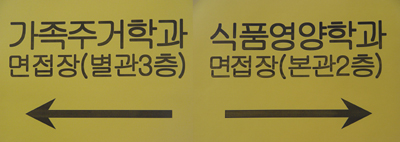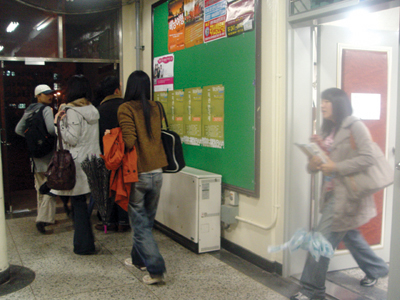YU has developed a number of special new courses, including a variety of theoretical and practical subjects. Furthermore, YU has improved the learning environment for lessons by increasing the number and quality of practice rooms. In this way, YU has reorganized departments, with changes to be put in effect from 2007.
What then, is the ultimate aim of all this change? Goals include a strengthening of YU's competitiveness by improving the professionalism of departments, and a breaking from YU's image as merely a local university. Let's take a look at the reorganization of departments which is going to start next year.
First, the School of Human Ecology & Kinesiology and the School of Natural Resources are going to be divided into separate departments. The former is going to be further divided into the Department of Family & Housing Studies and the Department of Food & Nutrition. The latter is going to be divided into the Departments of Horticulture, Landscape Architecture, and the Forestry School.
The schools were divided into different departments due to difficulties within the school system. In an early stage of the university's history, YU changed the above-mentioned departments into schools for the sake of raising the registration rate of high school students. Consequently, students generally flocked towards one department and students of outstanding ability went to another. Thus other departments left relatively deprived. In order to strengthen the identity of each department, the school system has devolved back into the department system.
From the students' points of view, there were problems in the school system. During their first year of study, students were not yet assigned to any specialized department. As a result, students felt lost and did not spend time effectively focusing on their futures. In each department, there was a problem. Each department came to have difficulties in terms of the employment rate and competitiveness because they didn't educate students professionally from the beginning.
The Department of Landscape Architecture developed a close relationship with some alumni students. Alumni actively supported their department; for example, the alumni association awards a prize for excellence among graduate students. In this way, the Yeungnam Observer (YNO) hopes that each department will develop and improve a more professional style of operation.

Secondly, the School of Chinese Language & Culture and the Department of English Language & Literature will see some change. Starting from 2007, the former will become an independent school with the new Department of Chinese Interpretation & Translation. The latter will also become the School of English Language & Literature, however, the Department of English Translation will be newly established. The evening program in the English Department will be discontinued. The ultimate aim of these changes is to develop schools by cultivating professional brains. Under the rapidly changing world situation and growing Sino-Korean exchange in many fields, the School of Chinese Language & Culture has recognized that there is enough demand for more than just the Department of Chinese Language & Literature; demand for graduates with skills in interpretation and translation is on the increase. This school will be reinvented by being split into three departments; the Department of Chinese Language & Literature, Chinese Culture & Information, and Chinese Interpretation & Translation.
The School of English Language & Literature will provide students with a higher standard of professional education related to English Linguistics, Literature and Translation in the new School of English Language & Literature.
Together with the above-mentioned changes, the School of Free Majors will be newly established. With a general decline in the number of newly enrolled students, the School of Free Majors is going to receive as many as 347 students among all freshmen. The aim of the establishment of this program is to help students choose their major through giving them time to study a variety of potential major subjects during their first year at university. Some colleges, however, such as the College of Medicine, Pharmacy, and Education, are excluded from this program.
Indeed, does all this restructuring have valid advantages? YNO questioned students about their opinions and potential problems related to the reorganization of their departments. According to the opinion of one student majoring in Dance, an increase in practice-room space is a positive change. This student said, however, that the major problem is confusion caused by lack of a sense of belonging. Since Korean dance as a dance art was integrated into the Korean Classical Music Department, students who major in Korean dance have not produced a creative performance with students who major in modern dance and ballet. On the other hand, students who major in Korean dance participated in the Gimcheon National Games with other students. Consequently, confusion as to identity, and lack of a sense of belonging with one group of peers developed.
In another case, a student from the School of Chinese Language & Culture said that the expansion and increasing professionalism of the school are good, as are the increase in number of juniors and new enrollees. The student worried, however, about freshmen's low rate of participation in activities related to the department because of their lack of a sense of belonging to the new school, due to the new system.
Another student from the Department of English Language & Literature said that they are positive about the reorganization of the department, but the schedule related to the course in English translation has not yet been explained in detail. Also, the evening program offered by the Department of English Language & Literature will be maintained for another three years, from 2007 to 2009, although this department will soon disappear. Because it is not going to be integrated into the daytime program, the evening program will be greatly weakened. So, students belonging to the Department of English Language & Literature who take the evening classes are recently feeling relatively deprived.

저작권자 © 영남대학교 언론출판문화원 무단전재 및 재배포 금지


